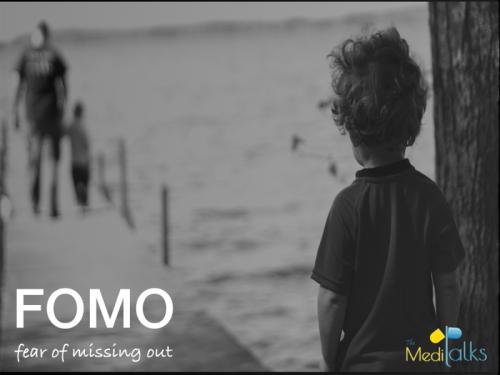FOMO (fear of missing out) and its impact on our lives - TheMediTalks

An acronym used very often, FOMO (Fear Of Missing Out) has become prevalent among the millennials and young generations in the last few years. A study describes it as general anxiety or fear of missing out on some things which others might be experiencing. Some others are of the opinion that it’s a kind of ‘social anxiety’ which urges one to continuously stay connected with social activities of their friends and acquaintances.
This condition or anxiety is more prevalent among teenagers and young adults who get anxious when they are not sure what their friends are doing. About 51% of teenagers have been reported to be going through FOMO. Although the idea existed earlier, FOMO has become more popular after the emergence of social media; and people who experience this phenomenon are more likely to be active on social media for a large chunk of their day. In fact, some scientists also say that FOMO is what has made social media platforms so successful.
What happens in FOMO physiologically?
With FOMO, there is a part of our brain called Amygdala which triggers the feeling of being left out. The Amygdala decides whether a situation could pose a threat to us and makes us feel stressed and depressed whenever we feel that we’re not a part of something.
Social media plays right into these feelings because when we see others enjoying a nice time and experiencing something we are not able to, we are left frustrated.
Why is FOMO a threat?
The fear of missing out causes young people to assume that they have a low ‘social rank’. This can result in inferiority complex and create feelings of anxiety and fear.
Secondly, FOMO causes people to be more affected by what happens outside instead of focusing on themselves. This results in an existential crisis over a period of time and low self-esteem.
Researches have linked the number of hours spent on digital media with higher levels of stress and depression.
For some people, FOMO may result in an increased addiction to their devices.
So what can we do?
Interact with your devices mindfully and meaningfully
Track and change negative thought processes and practice reframing.
Take regular breaks from digital technology and social media
Tell yourself that ‘you can't be everywhere and do everything’
Practice mindfulness
"Social media is undoubtedly a powerful tool for staying connected with friends and family. However, one must not forget that social media doesn’t paint an accurate picture of people’s lives. It is often a medium to glorify the good times and hide the bad. And hence, it is a false reality. The more meaningful things are spending time with family and friends, good health and sound mind, love, safety, and security"
If these were taken away from us – that would be the real “Fear Of Missing Out”.
Post Your Ad Here
Comments